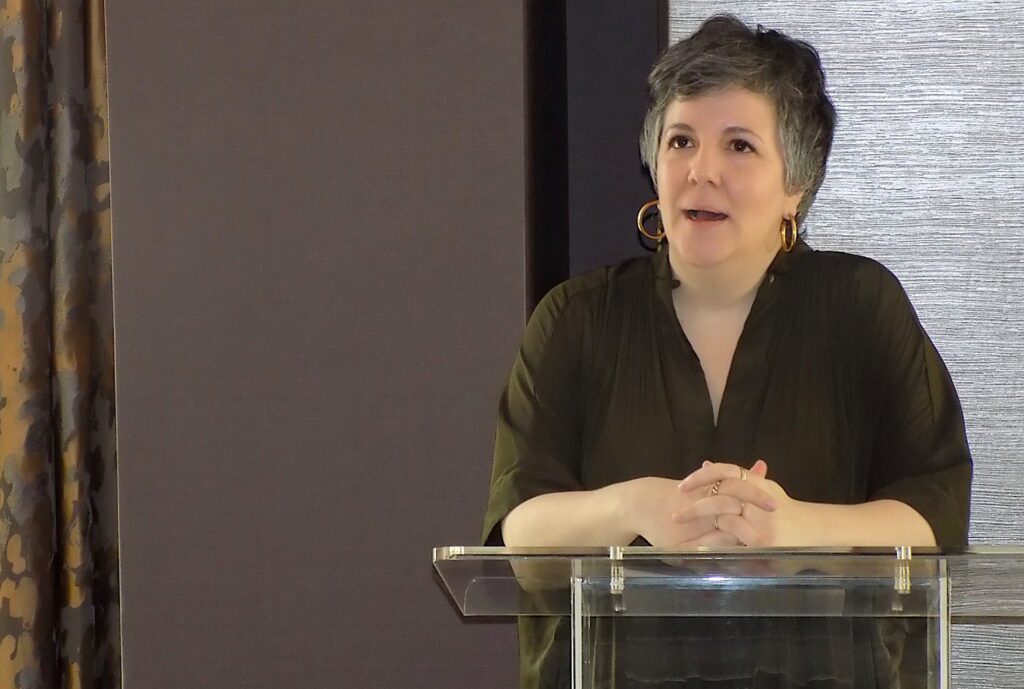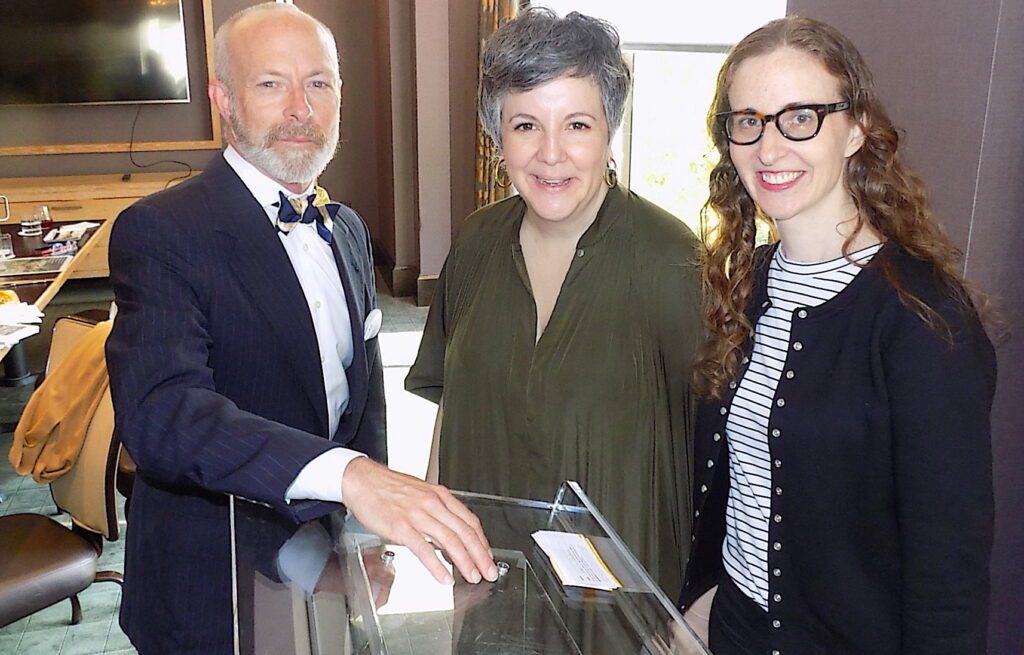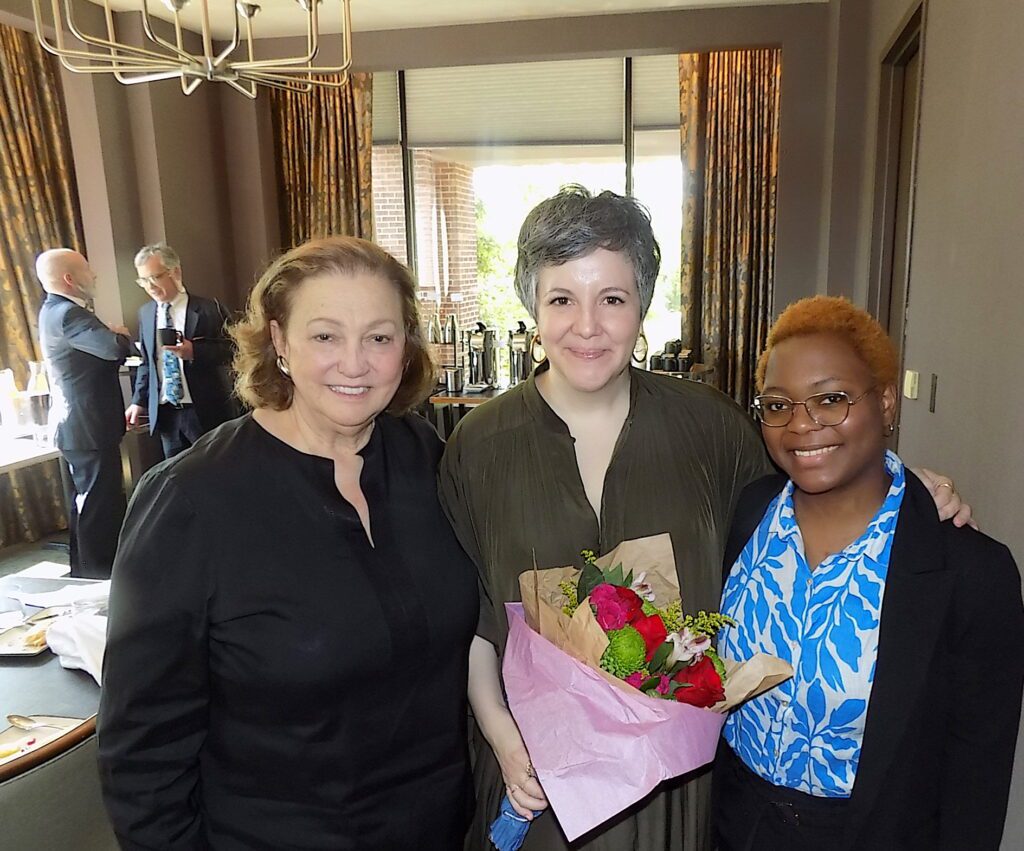On the Cutting Edge: Woolly Mammoth’s Maria Goyanes
By • May 22, 2023 0 1769

Why in the world would Maria Goyanes leave New York’s Public Theater, birthplace of “Hair,” “A Chorus Line” and “Hamilton” (which she helped produce), for a relatively small company in Washington, D.C.?
This was a question many asked Goyanes, and she asked herself, when the Brown University-educated daughter of immigrants was deciding whether to become Woolly Mammoth Theatre Company’s second artistic director, succeeding co-founder Howard Shalwitz.
Speaking at The Georgetowner’s May 18 cultural breakfast — four and a half years since she moved to D.C. — Goyanes seemed as energized as ever by the opportunity to produce cutting-edge theater in the nation’s capital.
“It’s not a coincidence that a place like Woolly Mammoth can thrive” here, she said, describing Washington as a city filled with smart people where, contrary to popular belief, civic dialogue is encouraged. Woolly’s niche, its “risk-profile” in Goyanes’s words, is theater that pairs aesthetic innovation with moral and civic provocation.
Starting out at the Public at age 24, Goyanes rose to become director of producing and artistic planning. Over her 15 years there, she worked closely with emerging playwrights, co-chairing Soho Rep’s Writer/Director Lab and serving as executive producer of the 13P collective.
Early on, she met the similarly young Michael R. Jackson, creator of “A Strange Loop,” a show, then in first-draft form, about a Black gay musical-theater writer. In 2021, Goyanes brought “A Strange Loop” to Woolly for a second staging after its New York run was cut short by the pandemic. Nominated for 11 Tonys, “A Strange Loop” won Best Musical and Best Book of a Musical.
Being able to say, “It didn’t exist before I got to work on it,” as in the case of “Hamilton” and “A Strange Loop,” is a major source of satisfaction for Goyanes. She also expressed pride in bringing “The Jungle,” a show that immerses the audience in a refugee community, to Sidney Harman Hall this spring in cooperation with the Shakespeare Theatre Company. “It felt like a crime for it not to come to Washington, D.C.,” she said. Needing a partner, Goyanes found STC equally enthusiastic.
Funding to help underwrite this “very expensive show” came from Bobbi and Ralph Terkowitz, she noted, though Bobbi Terkowitz was a former Studio Theatre board member. “We’re not in competition with one another,” commented Goyanes, who has found the D.C. theater scene a collaborative one, especially in the wake of the pandemic.
The pandemic continues to put a serious strain on live performance, according to Goyanes, who said she recently caught Covid for a second time. When the last week of Woolly’s February production of “Seven Methods of Killing Kylie Jenner” had to be canceled after one of the two actors tested positive: “In that one moment we lost upwards of $100,000.”
Taking care of cast and crew means changing the “show-must-go-on mentality,” she said, “a massive shift.”
The first federal support for nonprofit theaters since the Great Depression, as Goyanes put it, helped the sector survive, but that pandemic-related funding has now ended. She spoke about the need for stepped-up lobbying efforts, both nationally and on the Federal City Council, repeating the adage: “If you’re not at the table, you’re on the menu.”
In response to a question about whether the movie and television writers’ strike was affecting theaters, Goyanes said that, since it is so difficult to make a living as a playwright, many theater writers work for Hollywood. “Streaming is a play in many parts,” she explained.
When an attendee sought her opinion of “corporate” theater, such as that produced by Disney, Goyanes pointed to its significant employment of actors and funding of their health and pension plans. Meanwhile, Lin-Manuel Miranda’s compensation for work on vehicles such as “Moana” and “Encanto” gives him the freedom to undertake less-commercial projects. What’s more, his contract with Disney requires the company to fund diversity efforts, she said.
Of Woolly’s season-closing production, “Incendiary,” opening in June, Goyanes remarked: “I programmed this play and I’m a little bit afraid of it.” Though it deals with a mother breaking her son out of death row, raising issues of love and generational trauma, “it’s a comedy,” she said, employing tropes from Westerns, comic books and video games. She went on to share a few details of Woolly’s as-yet-unannounced 2023-24 season, which attendees were asked not to reveal.
The next cultural breakfast speaker will be Dr. Jonathan Binstock, new Vradenburg Director and CEO of the Phillips Collection, on Thursday, June 22, at the Four Seasons Hotel.

At the Four Seasons May 18: Felix Pfeifle, Maria Goyanes, artistic director of Woolly Mammoth Theatre Company, and Theater J Artistic Director Hayley Finn. Georgetowner photo.

Lizette Corro and Ngozia Hunter, both of Woolly Mammoth, flank Maria Goyanes, artistic director of Woolly Mammoth Theatre Company, at the May 18 Cultural Power Breakfast. Georgetowner photo.

